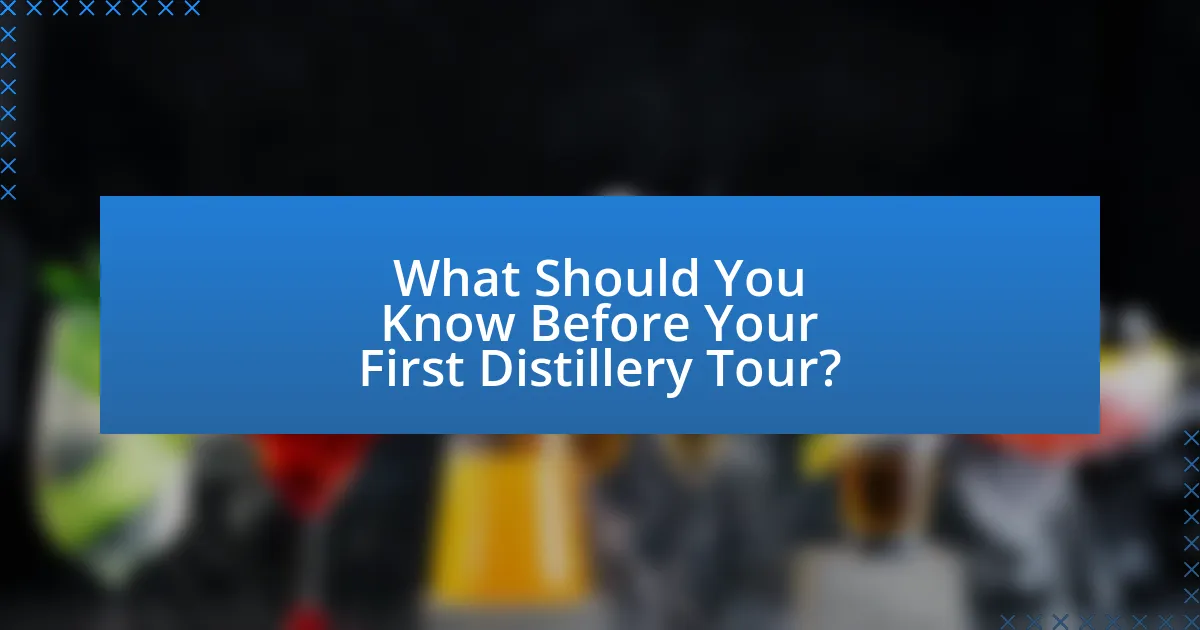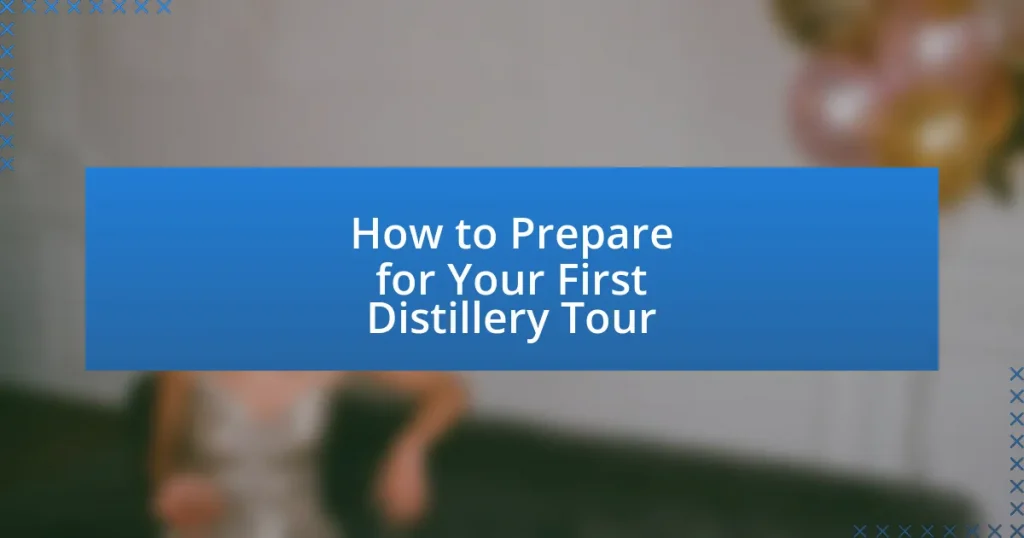The article focuses on essential preparations for individuals planning their first distillery tour. It outlines important considerations such as age restrictions, reservation policies, and tasting fees, which are crucial for a smooth visit. Additionally, it emphasizes the benefits of researching the distillery’s history and production methods to enhance engagement during the tour. Key aspects to prepare include transportation planning, appropriate attire, and relevant questions to ask the guide. The article also provides etiquette tips for tasting sessions and group behavior, ensuring a respectful and enjoyable experience.

What Should You Know Before Your First Distillery Tour?
Before your first distillery tour, you should know the distillery’s policies regarding age restrictions, reservations, and tasting fees. Many distilleries require visitors to be at least 21 years old, and some may have specific days or times when tours are available, necessitating advance booking. Additionally, tasting fees can vary, so it’s important to check if they are included in the tour price or if they require separate payment. Understanding these details ensures a smooth and enjoyable experience during your visit.
Why is it important to prepare for a distillery tour?
Preparing for a distillery tour is important because it enhances the overall experience and ensures that visitors gain valuable insights into the distillation process. By researching the distillery’s history, production methods, and types of spirits offered, attendees can engage more meaningfully with the tour guide and ask informed questions. Additionally, understanding the distillery’s unique characteristics allows visitors to appreciate the craftsmanship involved in spirit production, leading to a more enriching experience.
What are the potential benefits of being well-prepared?
Being well-prepared for a distillery tour enhances the overall experience by maximizing enjoyment and understanding. Preparation allows individuals to familiarize themselves with the distillation process, the types of spirits produced, and the history of the distillery, which can lead to more engaging conversations with guides and staff. Furthermore, being informed about tasting etiquette and the specific spirits available can enhance appreciation and enjoyment during tastings. Studies show that individuals who engage in pre-visit research report higher satisfaction levels and a deeper connection to the experience, as they feel more involved and knowledgeable.
How can preparation enhance your overall experience?
Preparation enhances your overall experience by ensuring you have the necessary knowledge and tools to fully engage with the distillery tour. When you research the distillery’s history, production methods, and types of spirits offered, you can ask informed questions and appreciate the nuances of the tasting process. Studies show that individuals who prepare for experiences report higher satisfaction levels; for instance, a 2018 study published in the Journal of Travel Research found that pre-trip planning significantly correlates with enhanced enjoyment and perceived value of the experience. Thus, preparation not only enriches your understanding but also maximizes your enjoyment during the distillery tour.
What are the key aspects to consider when preparing?
The key aspects to consider when preparing for your first distillery tour include understanding the distillery’s offerings, planning your transportation, and reviewing any specific guidelines or requirements. Knowing the types of spirits produced and the distillation process enhances the experience, as it allows for informed questions and engagement. Arranging transportation ensures timely arrival and safety, especially if tasting is involved. Additionally, reviewing guidelines, such as age restrictions or reservation policies, ensures compliance and a smooth visit. These considerations collectively contribute to a more enjoyable and educational distillery tour experience.
What should you wear for a distillery tour?
For a distillery tour, wear comfortable, casual clothing and closed-toe shoes. This attire is suitable because distilleries often have uneven surfaces and may involve walking or standing for extended periods. Closed-toe shoes provide safety and support, while comfortable clothing allows for ease of movement during the tour.
How should you plan your transportation to the distillery?
To plan your transportation to the distillery, first determine the distance and available modes of transport from your location. If the distillery is within driving distance, consider using a personal vehicle or a rideshare service for convenience. Public transportation options, such as buses or trains, may also be available, depending on the distillery’s location. It is essential to check the distillery’s website for specific directions and parking information, as many distilleries provide guidance on the best routes and nearby public transport links. Additionally, if you plan to sample spirits, arrange for a designated driver or alternative transportation to ensure safety.
What questions should you ask before the tour?
Before the tour, you should ask about the distillery’s history, the types of spirits produced, the duration of the tour, and any tasting options available. Understanding the distillery’s history provides context for the experience, while knowing the types of spirits helps tailor your expectations. Inquiring about the duration ensures you allocate enough time for the visit, and asking about tasting options allows you to prepare for any additional costs or requirements. These questions enhance your overall experience by ensuring you are well-informed and prepared.
What information should you seek about the distillery’s history?
To understand a distillery’s history, seek information about its founding year, key figures involved in its establishment, and significant milestones in its production methods. For example, knowing that a distillery was founded in 1820 by a notable figure can provide context about its heritage and evolution. Additionally, inquire about any historical events that impacted the distillery, such as changes in ownership or innovations in distillation techniques, which can illustrate its adaptability and significance in the industry.
How can you learn about the distillation process in advance?
You can learn about the distillation process in advance by studying relevant literature, attending workshops, and utilizing online resources. Books such as “The Science of Distillation” provide foundational knowledge, while workshops often offer hands-on experience. Online platforms like educational websites and video tutorials can also enhance your understanding of the distillation process, including its principles and techniques.

How Can You Make the Most of Your Distillery Tour?
To make the most of your distillery tour, engage actively by asking questions and taking notes during the experience. Engaging with the tour guide enhances understanding of the distillation process and the unique characteristics of the spirits produced. Additionally, sampling different products allows for a broader appreciation of flavors and techniques. According to the American Distilling Institute, participating in tastings can deepen knowledge about the nuances of various spirits, making the experience more enriching.
What should you do during the tour to enhance your experience?
To enhance your experience during the distillery tour, actively engage with the guide by asking questions about the distillation process and the history of the distillery. Engaging with the guide fosters a deeper understanding of the craft and the unique characteristics of the spirits being produced. Additionally, take notes on the different aromas and flavors you encounter during tastings, as this practice helps to refine your palate and enhances your appreciation of the products. Research indicates that active participation in learning environments significantly improves retention and enjoyment, making your tour more memorable.
How can you engage with the tour guide effectively?
To engage with the tour guide effectively, actively participate by asking relevant questions and providing feedback during the tour. Engaging in this manner demonstrates interest and encourages the guide to share more in-depth information. For instance, asking specific questions about the distillation process or the history of the distillery can lead to richer insights and a more interactive experience. Research indicates that active participation enhances learning and retention, making the tour more enjoyable and informative.
What should you pay attention to during the tasting sessions?
During tasting sessions, you should pay attention to the aroma, flavor profile, mouthfeel, and finish of the spirits. The aroma can reveal the complexity and character of the spirit, while the flavor profile indicates the balance of sweetness, bitterness, and acidity. Mouthfeel describes the texture and weight of the spirit on the palate, and the finish refers to the aftertaste and lingering flavors. Observing these elements allows for a comprehensive understanding of the spirit’s quality and craftsmanship.
What etiquette should you follow during the tour?
During a distillery tour, you should follow etiquette that includes being punctual, respecting the guide, and refraining from excessive noise. Punctuality is crucial as it ensures the tour runs smoothly and respects the time of both the guide and other participants. Respecting the guide involves listening attentively, asking relevant questions, and not interrupting while they are speaking. Additionally, maintaining a moderate noise level allows everyone to enjoy the experience without distractions. These practices enhance the overall tour experience and demonstrate courtesy to both the staff and fellow attendees.
How should you behave in a group setting during the tour?
In a group setting during the tour, you should exhibit respectful and attentive behavior. This includes actively listening to the guide, refraining from interrupting, and asking relevant questions at appropriate times. Such conduct fosters a positive experience for both yourself and fellow participants, enhancing the overall enjoyment of the tour. Additionally, maintaining a polite demeanor and being mindful of personal space contributes to a harmonious group dynamic, which is essential in shared environments like distillery tours.
What are the dos and don’ts of tasting alcohol at a distillery?
The dos of tasting alcohol at a distillery include arriving with an open mind, asking questions about the production process, and taking notes on your impressions of each sample. Engaging with the distillery staff enhances your experience, as they can provide insights and recommendations based on your preferences. Additionally, it’s advisable to pace yourself by sipping slowly and alternating between tastings and water to stay hydrated.
The don’ts of tasting alcohol at a distillery include consuming alcohol on an empty stomach, which can lead to quicker intoxication and impaired judgment. Avoid making negative comments about the spirits, as this can be disrespectful to the distillers and their craft. Lastly, do not rush through the tasting; taking your time allows for a more enjoyable and informative experience.

What Should You Do After Your Distillery Tour?
After your distillery tour, you should visit the distillery’s tasting room to sample their products. This allows you to experience the flavors and nuances of the spirits you learned about during the tour. Engaging with knowledgeable staff can enhance your understanding of the distillation process and the specific characteristics of each spirit. Additionally, consider purchasing a bottle or merchandise to support the distillery and take home a piece of your experience.
How can you reflect on your distillery tour experience?
To reflect on your distillery tour experience, consider taking notes during the tour to capture key insights and impressions. This practice allows you to document specific details about the distillation process, the types of spirits produced, and the history of the distillery, which can enhance your understanding and appreciation of the craft. Additionally, discussing your experience with fellow attendees or friends can provide different perspectives and deepen your reflection. Engaging with the distillery’s educational materials, such as brochures or websites, can also reinforce your learning and help you connect the tour experience to broader industry knowledge.
What notes should you take after the tour for future reference?
After the tour, you should take notes on key details such as the distillery’s production process, types of spirits produced, and any unique techniques or ingredients mentioned. Additionally, record the names of specific products you tasted, along with your impressions of their flavors and aromas. It is also beneficial to note any recommendations from the tour guide regarding food pairings or cocktail recipes. This information will help you recall your experience and enhance your understanding of the distillery’s offerings in the future.
How can you share your experience with others?
You can share your experience with others by writing a detailed review or blog post about your distillery tour. This method allows you to convey your insights, highlight key aspects of the tour, and provide recommendations based on your personal experience. According to a study by BrightLocal, 91% of consumers read online reviews, indicating that sharing your experience in this format can significantly influence others’ decisions. Additionally, you can engage with social media platforms, where sharing photos and stories can reach a wider audience and foster discussions about the distillery and its offerings.
What are some tips for future distillery tours?
To enhance your experience on future distillery tours, consider planning ahead by researching the distillery’s offerings and booking in advance. Many distilleries have limited capacity for tours, and securing a reservation ensures you won’t miss out. Additionally, familiarize yourself with the distillation process and the types of spirits produced, as this knowledge can enrich your understanding and appreciation during the tour. Engaging with the tour guide by asking questions can also provide deeper insights into the craft. Lastly, remember to pace yourself with tastings, as distilleries often offer multiple samples, and staying hydrated will help you enjoy the experience fully.
How can you apply what you learned from your first tour to future visits?
You can apply what you learned from your first distillery tour to future visits by refining your questions and focusing on specific aspects of the distillation process that intrigued you. For example, if you found the fermentation process particularly interesting, you can prepare targeted questions about it for your next visit, enhancing your understanding. Additionally, noting the types of spirits you enjoyed can guide your tasting choices in future tours, allowing for a more personalized experience. This approach is supported by the fact that engaging deeply with specific topics during tours leads to a greater appreciation and knowledge of the craft, as evidenced by feedback from distillery visitors who report increased satisfaction when they actively participate in discussions.
What resources can help you find more distilleries to visit?
Online directories and apps such as Distillery Trail, Visit Distilleries, and the American Distilling Institute’s website can help you find more distilleries to visit. These resources provide comprehensive listings of distilleries, including details on tours, tastings, and events. For example, Distillery Trail features a searchable database that allows users to filter by location and type of spirit, making it easier to discover nearby distilleries.
What are the common mistakes to avoid on your first distillery tour?
Common mistakes to avoid on your first distillery tour include not researching the distillery beforehand, which can lead to missed opportunities for learning about their unique processes and products. Additionally, neglecting to ask questions during the tour can result in a lack of understanding about the distillation process and the specific spirits being produced. Another mistake is underestimating the importance of tasting etiquette; for instance, rushing through tastings without savoring the flavors can diminish the experience. Lastly, failing to consider transportation options after the tour can lead to safety issues, especially if alcohol is consumed. These mistakes can detract from the overall experience and learning opportunities available during a distillery tour.
How can you ensure you don’t miss important information during the tour?
To ensure you don’t miss important information during the tour, actively engage with the guide by asking questions and taking notes. Engaging with the guide allows for clarification on complex topics and ensures that you grasp key details. Taking notes helps reinforce your memory and provides a reference for later. Studies show that active participation enhances retention of information, making it more likely that you will remember the important aspects of the tour.
What should you avoid doing to respect the distillery and its staff?
To respect the distillery and its staff, you should avoid disruptive behavior, such as loud talking or inappropriate comments. Disruptive behavior can create an uncomfortable environment for both staff and other visitors, undermining the distillery’s atmosphere and professionalism. Additionally, refraining from touching equipment or entering restricted areas is crucial, as this ensures safety and maintains the integrity of the distillation process. Respecting these boundaries demonstrates appreciation for the staff’s work and the distillery’s operations.


